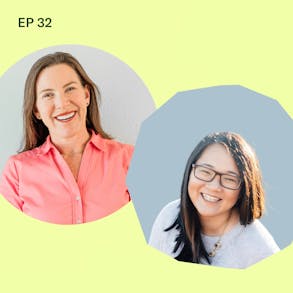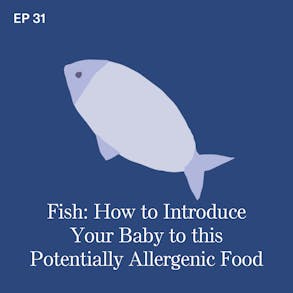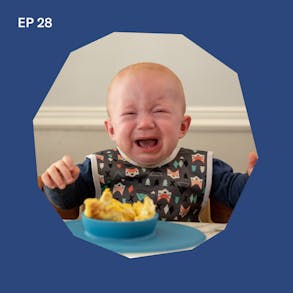GERD: Does Starting Solids Early Help Babies with GERD? with Peter Lu, MD
- Why parents of babies with GERD or reflux symptoms are told to start solid foods early and why we need to reframe the timeline for introduction for babies with reflux symptoms
- What reflux is, why the worst is probably behind you by the time your baby is ready to start solid foods, and what if any modifications we should make for BLW in GERD babies
- Dr. Lu's own baby-led weaning journey with his first baby Emma and his thoughts about dad guilt when it comes to offering her new foods as a working parent

LISTEN TO THIS EPISODE
Episode Description
What do babies with reflux or GERD need to do differently when it comes to starting solid foods? In this episode pediatric gastroenterologist Peter Lu, MD is joining me to run through how having GERD affects a baby's ability to do baby-led weaning. Dr. Lu specializes in motility disorders and is a real life first time dad of baby Emma. They’re doing baby-led weaning with her, so he knows exactly what you’re going through too!
If you’ve ever been told that starting solid foods early will help manage a baby's GERD, Dr. Lu has some new and exciting research and findings that will reframe how you think about timing your GERD baby’s intro to solid foods.
About the Guest
- Dr. Lus is a pediatric gastroenterologist who specializes in motility disorders. He works at Nationwide Children’s hospital where he sees patients and works in research.
- Dr. Lu is the co-host of a Pediatric GI podcast that he produces on behalf of the North American Society for Pediatric Gastroenterology, Hepatology and Nutrition and the name of his podcast is BOWEL SOUNDS.
- In this episode Dr Lu is talking about GERD in babies and what foods GERD babies should or should not eat and why. We’re covering whether thickening formula or breastmilk helps “keep foods down” and why the majority of baby GERD resolves by the time baby turns 1.
Links from this Episode
- His podcast is called BOWEL SOUNDS - pediatric GI and the medical world
- Gikids.org
- PLLU on twitter
- Plastic surgeon wife IG @drlesliekim
- Baby-Led Weaning with Katie Ferraro program with the 100 First Foods™ Daily Meal Plan, join here: https://babyledweaning.co/program
- Baby-Led Weaning for Beginners free online workshop with 100 First Foods™ list to all attendees, register here: https://babyledweaning.co/baby-led-weaning-for-beginners

Latest Episodes






Peter Lu (1s):
This is something that's so common, right? And for the vast majority of those babies who spit up, it's not a problem. It's something like the saying in the pediatric GI world is that it's a laundry problem, but not a medical problem.
Katie Ferraro (13s):
Hey there, I'm Katie Ferraro Registered Dietitian college nutrition, professor and mom of seven specializing in baby led weaning here on the baby led weaning made easy podcast. I help you strip out all of the noise and nonsense about feeding, leading you with the competence and knowledge you need to give your baby a safe start to solid foods using baby led weaning. Hey guys, welcome back today. We're talking about gut stuff, not your gut, your baby's gut. My guest is Dr. Peter Lu. Dr. Lou is a pediatric gastroenterologist at nationwide children's hospital. He's part of their GI motility center physician team there, but he's also an assistant professor of clinical pediatrics at the Ohio state university college of medicine.
Katie Ferraro (56s):
And Dr. Lu, let me just preface this interview with like, this guy loves gut stuff. He's the host of a pediatric GI podcast. So he produces this on behalf of the north American society for pediatric gastroenterology, hepatology and nutrition. And the name of Dr. Lu's podcast. Wait for it is Bowel Sounds. How great is that? He's here today to talk on my podcast about GERD, gastroesophageal reflux disease and Your Baby reflux for you, parents with babies who have reflux, you have gotten to hear Dr. Lu's message. And this is important stuff because about half of all, babies have some form of reflux and there's tons of confusion, shocker about what different dietary things we can be doing for our babies.
Katie Ferraro (1m 36s):
And a lot of the advice you hear is like, oh, you got to start solids early, cause it's gonna help your baby's GERD. So I wanted to pick Dr. Lu's brain about the research and his professional practice in clinic and find out if that's really true, like Does Starting Solids Early Help Babies with GERD. And if you've already started solid foods and your baby still is experiencing some godlike symptoms, Dr. Lou is going to be talking about what you can be doing from a nutrition standpoint as well. Oh, and another thing about Dr. Lu, he's also a Baby Led Weaning dad. First time daddy's doing BLW with his daughter, Emma, right now, he's going to be talking a little bit about that in the struggle for like meal prep. And now he feels kind of guilty and he's got to work a lot. He's not there for all the foods. And like, I gotta be honest. It's really refreshing to hear about some dad guilt as compared to mom guilt for once, but I'm gonna let you guys formulate your own opinions.
Katie Ferraro (2m 20s):
I think he is fabulous. I love the real life doctor dad perspective. So with no further ado, here's Dr. Peter Lu talking about GERD when Your Baby starts solid foods.
Peter Lu (2m 35s):
Thank you so much for having me.
Katie Ferraro (2m 36s):
I am so excited to chat with you about babies and GERD and starting solid foods. But before we dive in, could you give us a little background about the type of work that you do and maybe a little bit about your family. If you wanted to share about a particular baby who's doing Baby Led Weaning.
Peter Lu (2m 51s):
So I am a pediatric gastroenterologist at nationwide children's hospital in Columbus, Ohio, and I specialize in GI motility disorders. So disorders, how things move through the digestive tract. And that includes like rare things like gastro-paresis, but also disorders like gastroesophageal reflux and constipation. I'm also the research director of our GI motility center here. So in addition to seeing patients in clinic and in the hospital, I also do research on new ways to evaluate and treat these patients to by my family. So, right. My wife is a facial plastic surgeon, and about seven months ago we had our first baby. Her name is Emma. So yeah, in terms of like the audience for this podcast, like I'm living it right now. It has been an amazing journey so far.
Peter Lu (3m 33s):
And obviously it's just begun.
Katie Ferraro (3m 35s):
Are you guys doing Baby Led Weaning with Emma and how's it going? Like be honest, cause I know you guys both work a lot and some of the concerns you were sharing before we started is like things that all parents feel. And so it's nice to hear from the guests that maybe you feel the same way.
Peter Lu (3m 47s):
Obviously it's been an amazing experience, but also there is still, you know, both my wife and I, you know, we're full time. I took off like two weeks and she only took off about six weeks. And I think that there's still some, a little bit of guilt that we're not spending enough time with her or putting all this time in to prepare her food and read her books every night and all this stuff. Like sometimes he don't remember like the last time I gave her a bath, I feel like from a feeding step. And one thing that has written, obviously even before the invite to this podcast, we had been following you on Instagram. And so it was really helpful for practical tips on what to do. We had always had the idea that we wanted to do Baby Led Weaning, but practical tips on like how exactly to prepare the food to give her that was really helpful.
Peter Lu (4m 32s):
So I have to admit like it's not every single day that we're sitting down with her and giving her a new food, but we do our best. And I think that's kind of all they can do.
Katie Ferraro (4m 42s):
I love that. You mentioned that you do our little bit of meal prep. Now, do you have any tips for parents? Because we got a lot of working parents where like, I listen to this on the way to work or like, you know, right before bed, if we're doing laundry and stuff and how do you fit some of it in or any tip that's helped you as you kind of make the transition to solid foods with Emma?
Peter Lu (4m 58s):
Yeah. So nothing groundbreaking. I mean, no like weekdays, it's really hard for us to find the time. So on the weekend we just make a bunch of food. We give it to her prepared throughout the week. So kind of like what we do for our lunches.
Katie Ferraro (5m 10s):
That's awesome. And it's okay to try it multiple new foods. I mean, I know you're friends with Dr. Stulkus like, he'll tell you if it's not an allergenic food. Like you can do multiple new foods in a day through the low risk foods. And a lot of parents that work are like, listen, I got maybe one weekday in me. And then we do two weekend days. We try a bunch of new foods. Like that's awesome.
Peter Lu (5m 27s):
That's exactly what you're doing now. All right.
Katie Ferraro (5m 28s):
So we're here to talk today about GERD. I have been dying to chat with you. Like literally since we started the podcast, we've been looking for an expert to come on to talk about infant GERD because reflux and GERD, and you said gastroesophageal reflux disease, like, is this the same thing as just having a baby who spits up a lot, could you kind of set us straight on the terminology in your world?
Peter Lu (5m 48s):
I think it's super important to know like what exactly we're talking about before we go into it. So gastroesophageal reflux that's when the stomach contents come back up into the, that may or may not lead to spitting up or vomiting. And that's an, a happens in everyone. That's a normal process that by itself is really not a problem. But when reflux leads to quote unquote bothersome symptoms, which admittedly is like a subjective term, that's when we place the label of GERD or gastroesophageal reflux disease. So just as an example, so maybe that's the baby, who's vomiting after every feeding, but also having a lot of pain and irritability, discomfort, maybe not gaining weight as well. And so I think that kind of highlights the fact that reflux is something that happens really to some degree in every baby.
Peter Lu (6m 31s):
And there's a wide spectrum of the problems that can cause and how bad it can be. And you know, when you mentioned, so is that just the baby who spits up a lot? You know, does that mean they have reflux and answer that as like maybe, or probably since reflex is going to be the most common reason for spitting up shortly after feeding. But one thing to remember is that, you know, spitting up or irritability crying back arching that can be caused by other things too, for example, like cow's milk, protein intolerance or cows or protein allergy. So that's not a true IgE mediated food allergy, but things like that can cause symptoms that look identical to reflux. So yes, the baby who spits up a lot probably has reflux, but it looks like reflux is not always reflux.
Peter Lu (7m 13s):
And some of that is figuring out what is, and what is not is, you know, our job as pediatricians and GI doctors.
Katie Ferraro (7m 20s):
All right, Dr. Lou, when does infant GERD tend to run its course? Like, does it get worse as the baby gets older? Like how should parents be prepared if they know their babies had GERD and now they're getting ready to transition to solid foods.
Peter Lu (7m 32s):
Right. I think that's a really important point, especially when we're thinking about what to do when an infant has GERD. So we know that infants have GERD have symptoms that usually peak between two to four months of age. And then usually around six months, their symptoms will start to gradually improve as they grow and they develop. And also as their diet changes and solids are introduced and we typically will say, we expect the reflux to go away by 12 months to 18 months. And like, obviously there's some variability here. So I try to reassure parents. I've told this to like at six and a half months, if things aren't clearly better yet, like I really do expect this to get better. And I think it's also a way to think about, well, if we're struggling at three months or four months, maybe not jumping to do a whole bunch of testing and medications, if we know that distant, it should get better with time.
Katie Ferraro (8m 21s):
And I think for parents that are heading into the six month mark, when they start solid foods, it's really helpful to know that, Hey, maybe the worst of this is past us and we won't have to make a bunch of accommodations when we do start solid foods. Can we talk about timing for babies that have GERD? Is there a length of time that they should remain upright after having, you know, milk until they're six months of age and then foods as they start at six months and beyond,
Peter Lu (8m 45s):
It may not be what listeners want to hear, but no, there's not like a standard time that every baby has to be upright if they have GERD. So yes, it's true. Like if you hold them upright longer, the has longer time to empty. So there's less likely the baby will spit up, but you know, there's not a firm rule. I feel like there's already enough things that babies that parents are thinking about. There's I don't want to make another rule for parents to follow. It's really based on the individual baby, how bad their reflux is. And really the parent knows best, like when the baby is more likely to spit up. So I think that should be kind of individualized to the baby.
Katie Ferraro (9m 17s):
You know, parents like to time stuff like they'll email me, like how many seconds should the baby be sitting up independently before I know they're ready to eat. So, but that's right. The gut stuff is so individualized, right? What works for one doesn't work for the other and you guys know your own guts best and you know, your baby's guts best. I've got like a litany of questions. I've been meaning to ask you. So I know we're moving through these pretty quickly. Another timing question. So I know there's some babies, especially if they're bottle fed, they can debris proficient. They can drink an eight ounce bottle, maybe at six or seven months of age, if that belly's full of food and they come to the table, they're doing Baby Led Weaning. They have a gag, which we all know is a natural part of learning how to eat. But for babies with a full belly, a particularly involved gag can sometimes elicit a vomit response. So I'll generally tell parents if that's happening.
Katie Ferraro (9m 57s):
You know, a little bit of vomiting is typical, but like if your baby's vomiting every meal or every day, not typical, wait about an hour from the end of the milk feed until the beginning of the solid food feed, like breastfed babies. I feel like it doesn't really matter as much because they're not drinking that volume with Emma. Have you guys noticed like a certain amount of time that you try to wait in order to let her stomach empty when she does go to start solid foods? So she doesn't vomit. So it's true
Peter Lu (10m 21s):
With the liquid meal. Typically we expect the baby to empty their stomach by maybe around 90 minutes to two hours or so I think waiting an hour is a reasonable amount of time, right? So for us, we do try to give solids kind of in between feedings. So there's some time there we don't want to, as you said, a full stomach is already predisposed to reflux, right? So there's gonna be more pressure in that small little baby's stomach. If we're trying to feed on top of that, any opening of that lower esophageal sphincter, that muscle, the, between the esophagus and the stomach that helps keep stuff down, any opening that's gonna let stuff potentially come up. So, right. So I think it does make sense to space out a little bit, not only like feedings of all kinds, whether it's breast milk formula or solid foods.
Katie Ferraro (11m 5s):
Dr. Lou, how common is reflux in babies?
Peter Lu (11m 9s):
A little bit of a complicated answer. I think, you know, one of the things that we talked about before is that reflux is a term that kind of means different things, right? So we know that some degree of just having stomach contents come up and the esophagus is a normal common event. In some studies about half of babies under four months will have reflux that leads to spitting up and potentially vomiting at least once a day. So that's a very common thing, but another's showed that about two thirds at four months of age, had some degree of spitting up. But you know, we always, as we talked about, that's not necessarily a problem. And if it's happening that frequently, that's probably like a normal thing. Then that reflux that's bothersome. So reflux that meets the criteria for gastroesophageal reflux disease or GERD, that's much less common.
Peter Lu (11m 53s):
There've been some studies showing that that affects maybe 20 to 25% of the infants. But even that, I think there's a lot people in the field who feel like that may be a little bit of an overestimate and part of that's because the diagnostic criteria, the way that we define that diagnosis is a little bit subjective. Right? It's based on
Katie Ferraro (12m 10s):
Security for you, right? Like if early on your stands, it they'll have to come to the GI doc to figure it out.
Peter Lu (12m 16s):
Right. So, yeah, so it's hard to say, but yeah, reflux definitely is a common problem, GERD where it's causing a problem. You know, maybe those babies need the evaluation or treatment. That's going to be a much smaller fraction.
Katie Ferraro (12m 27s):
We'll talk about some evaluations and treatments. Like, are we talking surgery here? Should they start solid foods early? Do we take medications? Like if you've been told your baby as GERD and you're getting towards the six month mark, what should we do?
Peter Lu (12m 37s):
So there's a lot of different parts to that answer. So first of all, in terms of testing, like how do we make the diagnosis? The diagnosis is really made based on the story in a good physical exam by the physician, really to make sure that we're not missing other reasons for vomiting. Cause I think like we talked about before, not all vomiting is reflux and especially in babies, if there are concerning signs, like the vomiting is big, like large volume really forceful consistently, especially if there's any blood or bile in the vomit, if it's impacting the waking of the infant, all those things mean that maybe there needs to be some more evaluation to look for other reasons for vomiting. So testing wise, if the story and the exam are reassuring, then that's really enough to make that diagnosis.
Peter Lu (13m 23s):
Technically like, yes, there are more specialized tests we do that can measure like how often reflux happens in a 24 hour period and whether there's acid or not, and that kind of stuff, but really that's reserved for severe cases that are more complex. And in terms of treatment, this has evolved a little bit over time, but certainly, you know, we had talked about the natural history of reflux and how typically with time this will get better, but obviously reflux at the moment when it's at its worst, especially can be very distressing and stressful and can cause a lot of discomfort to the baby. So yes, there are things that we will do for it. Typically that starts with modifying feeding. One of the most basic things would be making sure we're not overfeeding the baby as you had alluded to.
Peter Lu (14m 6s):
So if we give too much into the small stomach, that's going to predispose to reflux, there is some data that thickening feedings can help decrease how often stuff comes up, right? So solids tend to stay down better than liquids. So thickening form of the, to some degree can help keep stuff down. So that's something that we'll think about as well, if it makes sense for that family in that situation. And then after that, it's really, while we kind of progress through this, we're still also thinking about the baby's age, whether this is impacting other things like weight gain. But after that is something that potentially trying a change in their diet to remove things like cow's milk protein or soy protein.
Peter Lu (14m 46s):
And that's not really to treat the reflux itself. It's because we know that cow's milk, protein intolerance or food protein induced Proactive colitis, where there's a sensitivity to a certain food proteins that that can look just like reflux. And so trying a trial of two to four weeks of cutting that out, whether it's changing to a more broken down formula or asking the mom to try to cut out milk and dairy from their diet. So that can come into play as a, almost like a test, but also a treatment to see if that helps with decreasing vomiting. And then finally there are sometimes I'll use acid medications, but really, you know, we try to really reserve that for patients who don't respond or babies who don't respond to some of the other things we just talked about,
Katie Ferraro (15m 29s):
Let's go back to talking about the thickening feedings because parents hear that. And then what they hear is are they get it? Especially sometimes older people recommend it, oh, just put some rice cereal in the baby's bottle. It will help them sleep through the night and be less fussy. And now we're concerned about potential choking hazard and et cetera, but there's some parents. I was just speaking to someone recently. So at least three months old, her pediatrician told her to do rice cereal because that sickened food is going to help the GERD go away.
Peter Lu (15m 53s):
True. So there's no medical research evidence that shows that introducing solid foods early, especially that age, that, that will at all treat reflux. Right? So I had alluded to thickening feedings. That's like thickening, like formula, for example. So when the baby feeds that stays down better, but if the baby got rice cereal in the morning, like that's not going to affect any of the feedings later on in the day. So no. So giving solid foods or rice cereal on its own, like that's not going to help with reflux. The thickening, as you had mentioned in the past, we used to primarily recommend thickening formula with rice cereal.
Peter Lu (16m 34s):
As you've talked about in past episodes, there are concerns now about rice cereal and arsenic and things like that. So we've kind of moved away from that a little bit. Although many people still do recommend rice cereal for formula fed babies. We'll oftentimes recommend some of the anti regurgitation formulas that are already thickened, but yes, so thickening formula can help with reflux in the right patient, but giving rice cereal or other foods early, that's not going to be a treatment for reflux.
Katie Ferraro (17m 2s):
I know I asked you a lot of leading questions, but that one, I was like, I hope that he's on board with this. Cause I, the worst is that the doc comes on. It's like, yeah, totally go ahead and start solid foods at three months of age, it's like, well, you know, maybe like it could help, but then if they choke and die in the meantime, is that really like a good intervention? So I appreciate your nuance there. That there's a number of different ways to think. And can you talk about some of those formulas, like the hydrolyzed or broken down ones or certain thicker formulas? Are they like super expensive? Do parents have to be on them forever? Do you have to have a prescription? How does that work?
Peter Lu (17m 32s):
Yeah. So that's a great question to you. Cause I think as I alluded to at a certain point in the pathway, you know, especially if babies have continued reflux, GERD symptoms, despite adjusting feedings or making sure we're not overfeeding, there may come a time that we want to try to cut out cows milk and sweet soy protein and oftentimes formula fed babies out. It comes in the form of a partially hydrolyzed formula, but that's not something that the baby needs for sure for the rest of their infancy. Right? I mean, that's a test it's because we don't have better tests to diagnose things like cow's milk protein intolerance in babies. It's not a traditional food allergy, even though oftentimes it's referred to as cosmic allergy.
Peter Lu (18m 13s):
So traditional allergy testing is not going to work. And it's something where we try to test for it by removing it from the diet and watching what the baby does. So it typically will. I usually recommend a two to four weeks of trying this formula or having the mom try to eliminate milk and dairy from her diet. That's a challenging thing to do. You know, it does take a little bit of time for the protein to fully clear from breast milk, but that's not like a permanent thing, right? So it depends on how the baby does. I think one mistake is sometimes people will just make that change in the formula and just leave it there forever. Even if the baby didn't get any better. So the idea is it's a test to see if these symptoms that suggest reflux are actually caused by an intolerance of cow's milk or soy protein.
Peter Lu (18m 59s):
And if it's not, then we go back to a regular formula or, you know, mom returns to a regular diet because right. Those formulas are more expensive. And obviously for a mom with a young baby, especially cutting out milk and dairy from her diet, that's going to be very challenging.
Katie Ferraro (19m 14s):
It's drastic it devastating for the moms just to like they write to me all the time. And I appreciate you mentioning that there's a time limit on some of these elimination diet trials, because we do meet moms who are like, oh, since the first week I was breastfeeding, I've cut out all dairy and cheese and I'm on this new Tramadol or something super expensive. And you're like, oh my gosh, have you had a followup with the GI specialist? We'll know when we, after we left the hospital and that's the problem. Sometimes you leave the hospital, you have your pediatrician, which is great. But if you don't have the specialist care, follow-up sometimes you might be on these crazy therapeutic interventions that are super expensive and maybe not entirely necessary. So I think it's great to remind us like, oh, we should be checking back. Like, do we still need to be on these things? Okay. I know you are an Instagram fan.
Katie Ferraro (19m 55s):
Are you guys, he's also a podcast host, this is the best thing ever. Can you please just tell us about your podcast. You should do it.
Peter Lu (20m 0s):
Okay. Okay. So I created and host a podcast for our pediatric GI society. It's called bowel sounds the pediatric GI podcast. I'm glad we got to balance sounds before other GI societies got to it. But, but yeah, we talk about various GI topics and conditions and yeah. People should check it out.
Katie Ferraro (20m 18s):
There's has never been a better podcast name than bowel sounds. I love it. Okay. Let's talk about Instagram though, because parents send me these wackadoodle accounts of bloggers and moms, and I'm sure they're well-meaning but totally not credentialed individuals like literally giving therapeutic nutrition advice about GERD for babies. Like maybe they had one baby with GERD and you recommend all these supplements and these ridiculous diets that have no basis in evidence. What should we avoid or look out for when it comes to basically sketchy sources of info for babies, with guard. Cause if you're saying it affects half of all babies, like there's a huge market to exploit parent's fear about GERD and how do we know what's legit and not,
Peter Lu (20m 57s):
I think one thing to highlight, like you said, and this is something that's so common, right? And for the vast majority of those babies who spit up, it's not a problem. It's something it's like the saying in the pediatric GI world is that it's a laundry problem, but not a medical problem. This is something that the babies will outgrow. But I agree because especially as a first time parent, I understand like anytime something, even when my baby spits up her vomits, you know, I, I think about it a little bit. It's something to pay extra attention to. Cause I do think there are people who may be trying to use this fear for their own gain. And so just like for all information we read on the internet, you know, I think you got to make sure that the source is trustworthy by doing a little bit of research and looking at their background.
Peter Lu (21m 39s):
So you're trying to look for information, put out by professionals with the right credentials who specialize in these disorders. One other thing I'll just a plug I'll put out. There is our pediatric GI society has a patient education website called GI kids. The website is a GI kids.org and there's a section on reflux and there's some videos and resources. And so things like that, I think patient organizations like GI medical organizations over time, obviously there's a huge recognition that us talking to a family and clinic every four months, that's not going to be the same as like patients are not going to be waiting with their questions to ask that at that appointment, they're looking online for answers. So I think over time, our medical societies will be better at putting information out there as well.
Katie Ferraro (22m 23s):
It's the same thing in everyone's field. I feel like, like, do you have a few credentialed professionals? There's some evidence, but when it applies to a lot of babies, like starting solid foods or babies who spit up, there's this huge potential for misinformation. So thank you so much for being here today for sharing this information with our audience. Where can we go to learn more about you and your work that you're doing as a pediatric GI
Peter Lu (22m 45s):
Nationalist? I'm on Twitter. My handle is P L L U. And then as you mentioned, I have a podcast called bowel sounds. So check it out and that's about it.
Katie Ferraro (22m 54s):
You're very good with words. So thank you for sharing your words about GERD with us. I'm going to link to all of the resources that you mentioned in today's episode on the show notes, which you guys can find blwpodcast.com. Dr. Lou, thank you so much for being here today
Peter Lu (23m 8s):
For having me and thank you for all the information you put out there. How cool
Katie Ferraro (23m 12s):
Well, Dr. Lou, I mean, I love what the wood could take a kind of dorky topic, no offensive Kurt is your life's work, but like GERD, you know, not always super interesting and make it really interesting and applicable and share his personal real life experience as well as his clinical expertise. So thank you Dr. Lou, for that great episode, I am going to link up all the resources. He mentioned, including a link to his podcast. Bowel sounds on the show notes for this episode, which you guys can find@blwpodcast.com/182. Thank you so much for listening. I'll catch you next time.

The Program Baby-Led Weaning with Katie Ferraro
A step-by-step digital program for starting solid foods safely and navigating the original 100 FIRST FOODS™ meal plan with baby-led weaning.
 EXPERT-LED, PROVEN APPROACH TO EATING REAL FOOD
EXPERT-LED, PROVEN APPROACH TO EATING REAL FOOD CONCISE VIDEO TRAININGS TO MASTER BABY-LED WEANING
CONCISE VIDEO TRAININGS TO MASTER BABY-LED WEANING 100 FIRST FOODS DAILY MEAL PLAN WITH FOOD PREP VIDEOS
100 FIRST FOODS DAILY MEAL PLAN WITH FOOD PREP VIDEOS
Baby-Led Weaning for Beginners Free Workshop
Is your baby ready to start solid foods, but you’re not sure where to start? Get ready to give your baby a solid foundation to a lifetime of loving real food…even if you’re feeling overwhelmed or confused about this next stage of infant feeding.
Get baby-led weaning recipes and tips delivered to your email inbox.

